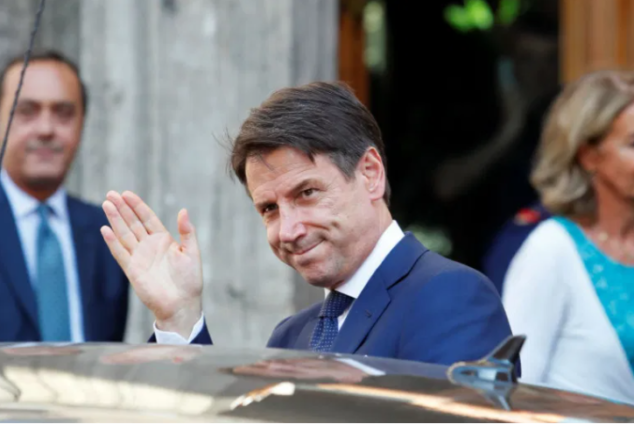Italy is battling a soaring death toll and questions over EU recovery funds, but the PM faces a more immediate challenge – keeping his job.
Italy’s Prime Minister Giuseppe Conte has more than enough on his plate as he deals with a raging coronavirus pandemic, but also faces the more immediate challenge of staying in office.
Despite a soaring COVID-19 death toll and with a deadline looming to come up with a credible plan to spend billions of euros in EU recovery funds, the government has been consumed for weeks by internal sniping from former Prime Minister Matteo Renzi.
Renzi has threatened to withdraw his small but pivotal Italia Viva (Italy Alive) party from the centre-left coalition that Conte heads, which would force its collapse.
“The situation is, in technical terms, a disaster,” the politician, who led Italy from 2014 to 2016, said in an interview with the Rete 4 channel broadcast late on Monday.
Asked about the chances of Conte keeping his job, he said: “We’ll see.”
Renzi has complained about slow progress in rolling out coronavirus vaccinations and delays in school reopenings and has lambasted Conte for seeking to concentrate power in his hands.
This includes setting spending priorities without enough consultation for the 196 billion euros ($240bn) Italy expects to receive as part of a post-virus EU recovery plan, which is due to be submitted to Brussels by mid-April.
Italy has recorded more than 75,000 deaths from the novel coronavirus, the highest toll in Europe, and the associated lockdowns and restrictions have hit the economy hard.
The leaked draft spending plan includes more than 50 priorities, with only nine billion euros ($11bn) for Italy’s cash-strapped health system.
“This cannot work, there’s too much money on handouts and too little on investments,” Renzi said.
The showdown with Conte is expected to come to a head in the coming days when ministers meet – possibly as early as Wednesday – to discuss the EU plans.
Government without Conte
Conte could try to placate Renzi with a cabinet reshuffle, either by persuading some ministers to step down or by resigning himself to seek a new mandate from President Sergio Mattarella with a revised list of cabinet ministers.
But this option is, of course, fraught with risks.
Once Conte resigns, Renzi could insist that the governing coalition – which includes the populist Five Star Movement (M5S), the centre-left Democratic Party (PD) and the leftist Free and Equals (LeU) – can survive only under a new prime minister.
However, there are no obvious alternative candidates. Former European Central Bank President Mario Draghi is often mentioned as a possible saviour for the country, but he has shown no appetite for a political career, at least in public.
“Personally, I think that a government without Prime Minister Giuseppe Conte would be folly,” tweeted Federico D’Inca, a minister and member of M5S, the biggest party in Parliament.
Conte, a once-obscure law professor who has never himself been elected, has so far proved surprisingly adroit at navigating the choppy waters of Italian politics.
He has been in office since 2018, first at the helm of a right-leaning administration comprising the M5S and the League.
The coalition collapsed a year later, but he stayed on at the head of a left-leaning government cobbled together between the M5S, PD and smaller allies.
If Conte is removed and politicians cannot agree on a successor, Mattarella could be forced to call snap elections – two years early.
Opinion polls suggest a victory for the right-wing opposition bloc fronted by Matteo Salvini’s League and Giorgia Meloni’s Brothers of Italy, two stridently anti-immigration and eurosceptic parties.
Renzi’s party meanwhile risks being wiped out – they are currently polling at approximately 3 percent.
Wolfango Piccoli, co-president of the Teneo consultancy firm, said he expects a reordering of the coalition parties but for Conte to stay in power.
“The strength of the ruling coalition in Italy is its weakness – they know they cannot afford elections,” he told the AFP news agency.
“I don’t think this crisis will yield anything particularly meaningful. It will just be another waste of time at the worst time possible for the country.”
The EU is officially staying out of it, but with a watchful eye.
“Even before the COVID crisis, Italy – because of its debt problem, non-performing loans and its fragile politics – was a country that was more closely watched than others,” an EU source told the AFP.
“As a government drawing up a plan, it makes things very difficult if you risk a coalition collapse at every second.”
Latest Stories
-
Court sets Jan. 6 to rule on NPP’s application to set aside injunction against Akwatia MP-elect
29 minutes -
GPL 2024/25: Bechem United ease past leaders Heart of Lions
39 minutes -
Edem Agbana expresses readiness to begin work as MP after completing registration
2 hours -
Katamanto fire: Gov’t must reconstruct the market, not the traders – Abuakwa South MP-elect
2 hours -
High Church of Africa inaugurates mineral water factory on 2nd anniversary
2 hours -
Ablekuma North results collation suspended over another disagreement
2 hours -
Kwakye Ofosu says 10 Heads of State will attend Mahama’s inauguration
3 hours -
Rwanda-backed rebels seize key town in DR Congo
3 hours -
Nominate Alban Bagbin as Speaker of 9th Parliament – Mahama tells NDC caucus
4 hours -
Russian newspaper says its reporter killed by Ukraine drone strike
5 hours -
Hamas releases video of Israeli hostage Liri Albag as ceasefire talks resume
5 hours -
New York becomes first US city with congestion charge
5 hours -
Severe winter storm puts much of US on high alert
5 hours -
Ebi Bright, Baba Sadiq lose parliamentary elections after court-ordered collation
6 hours -
NPP’s Martin Adjei-Mensah declared MP-elect for Techiman South constituency
6 hours

